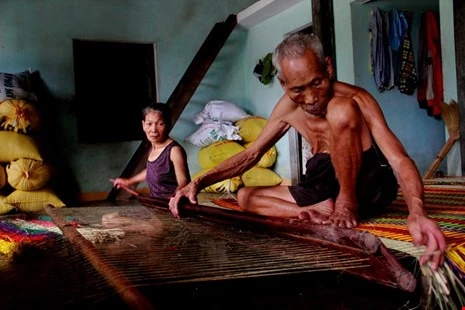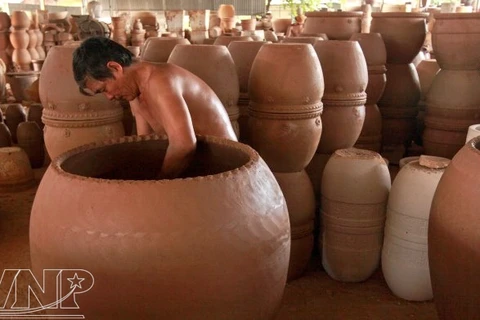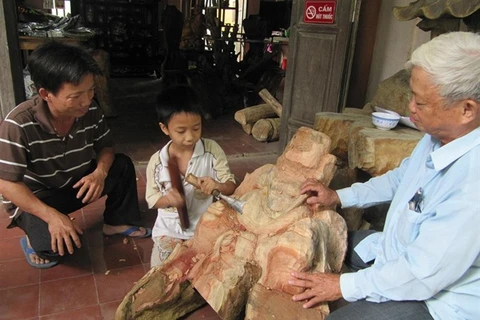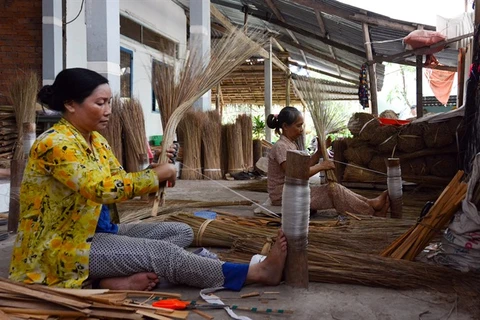 Carpenters work without protective equipment at the Minh Duc craft village in Phu Tho Province, about 90km northwest of Hanoi ( Photo: baophutho.vn)
Carpenters work without protective equipment at the Minh Duc craft village in Phu Tho Province, about 90km northwest of Hanoi ( Photo: baophutho.vn) Hanoi (VNS/VNA) - In the 39-degree Celsius heat of a summer day, carpenters in the craft village of Minh Duc in Phu Tho province diligently chop up large wooden logs to make furniture in their home-based wood workshops.
Although the job involves the use of saws and inhaling wood dust, no one in the village uses protective equipment, the local online newspaper Phu Tho reported. “It’s too hot and cumbersome to put them on,” said Du The Hoa, 17, working in his grandfather’s workshop, naked from the waist up. “Besides, the drilling, chiseling and hewing are not really dangerous.”
That was the explanation he got from his grandfather, Du Thanh Tinh, with 50 years of experience in the craft, for not wearing protective clothing and a mask. The 73-year-old carpenter had his right hand cut off in a saw accident two years ago.
Labour safety is being ignored both by employers and labourers at craft villages, resulting in thousands of work-related accidents and cases of occupational disease each year.
Some 14 million labourers are working at 1,200 traditional craft villages in the country, the infonet.vn online news website reported.
About 90 percent of them are directly exposed to heat, dust, noise, and chemicals, which make them more prone to electric shocks and burns, as well as skin, respiratory and digestive diseases.
About 7,900 labour accidents occurred in the country last year, 60 percent of them resulted from non-compliance with safety regulations, according to the the Ministry of Labour, Invalids and Social Affairs (MOLISA).
Roughly a hundred labour accidents occur each year in the metal craft village in the capital city’s outer Thach That district. Most work by the 5,000 labourers involves cutting corrugated sheets, which can easily hurt workers’ hands.
The working conditions in most craft villages are unsafe, according to Luu Duy Tan, Vice Chairman of the Vietnam Village Association. For example, the Van Phúc silk craft village in the capital’s Ha Dong district, with 700 looms, contains fire hazards, but only 10 of dozens of silk enterprises are equipped with fire extinguishers.
Their equipment is often outdated, with some assembled manually from old and used parts that no longer function properly, Tan added. “Most production establishments are not equipped with ventilation, vacuum and toxic treatment systems. Little attention has been paid to buying social and health insurance for employees.”
The reason behind these shortcomings is that most craft villages are formed arbitrarily by residents themselves, according to MOLISA.
Employers at these villages often get too caught up in making profits and pay less attention ro ensuring basic rights, such as insurance coverage, for their employees. Some do not report labour accidents on purpose, according to MOLISA’s Department of Labour Safety.
Lack of awareness of their rights to such things as labor contracts and insurance makes labourers particularly vulnerable to accidents and robs them of the right to compensation from employers, according to the department.
Nguyen Ngoc Dung, head of the Department of International Cooperation under the Vietnam Cooperative Alliance, said that apart from raising labourers’ awareness of labour safety, regulations on ensuring their rights should be imposed on owners of craft production units and craft enterprises.
“[They] should provide labourers with periodic health checkups, especially with the dangerous working environment at craft villages,” he said. “Labourers should also be informed of the regulations on labour safety, food safety, and working environment sanitation.” Local authorities should also join in ensuring labour safety at craft villages, he added.
“The authorities should require enterprise owners to provide social, health and compensation insurance for not only contract employees but also seasonal employees,” he said.-VNA
Lack of awareness of their rights to such things as labor contracts and insurance makes labourers particularly vulnerable to accidents and robs them of the right to compensation from employers, according to the department.
Nguyen Ngoc Dung, head of the Department of International Cooperation under the Vietnam Cooperative Alliance, said that apart from raising labourers’ awareness of labour safety, regulations on ensuring their rights should be imposed on owners of craft production units and craft enterprises.
“[They] should provide labourers with periodic health checkups, especially with the dangerous working environment at craft villages,” he said. “Labourers should also be informed of the regulations on labour safety, food safety, and working environment sanitation.” Local authorities should also join in ensuring labour safety at craft villages, he added.
“The authorities should require enterprise owners to provide social, health and compensation insurance for not only contract employees but also seasonal employees,” he said.-VNA
VNA























